When Australia's prime minister, Julia Gillard, told the opposition leader, Tony Abbott, this week that if he wanted to know what misogyny looked like he should pick up a mirror, it was seen by many women as a defining moment for feminism in the country.
"I almost had shivers down my spine," said Sara Charlesworth, an associate professor at the University of South Australia. "I was so relieved that she had actually named what was happening. She was so angry, so coherent and able to register that enough is enough."
Gillard's denunciation of sexism in politics came during a debate about whether the speaker of the house should resign for sending text messages that denigrated women. Abbott told Gillard that unless she sacked Peter Slipper over the texts, she was just as bad as him. "I will not be lectured about sexism and misogyny by this man. Not now, not ever," she fired back across the dispatch box. "The leader of the opposition says that people who hold sexist views and who are misogynists are not appropriate for high office. Well I hope the leader of the opposition has got a piece of paper and is writing out his resignation."
It was the first time an Australian leader – and possibly any world leader – had delivered such a forthright attack on misogyny in public life. Gillard cited Abbott's past description of abortion as "the easy way out"; his characterisation of Australian women as housewives who did the ironing; and his suggestion that men were better adapted than women to exercise authority and issue commands. She listed Abbott's calls for her to, "politically speaking", make an honest woman of herself, as well as his appearance at political rallies in front of placards that described her as a witch and another man's bitch.
Professor Barbara Pini, who teaches gender studies at Griffith University in Queensland, said it was a watershed moment. "It's incredibly significant to have a prime minister powerfully state that she has experienced sexism and even more powerfully state that she will refuse to ignore it any longer," Pini said. "That the sexism which is so deeply embedded in the Australian body politic was named may give some women licence to express and seek to counter the sexism they have experienced in their working lives."
According to the Australian Human Rights Commission, one in five Australian women has experienced sexual harassment in the workplace. A recent study by Monash University in Melbourne showed that 57% of women who worked in the media had experienced sexual harassment. It said women were badly under-represented in the top levels of media management, holding 10% of positions, compared with an international average of 27%.
The report's author, Louise North, said her findings might go some way to explaining why much of Australia's mainstream media concluded that Gillard's speech was a political disaster. "PM will rue yet another bad call," said one comment piece. "Gillard's judgment was flawed. All she achieved was a serious loss of credibility," said another. That response was in stark contrast to much of the commentary in social media and conversations between women around the country, which were alive with praise for the prime minister's stance.
"Leader writers are generally white, middle-aged men and they have no perception of gender bias," North said. "They don't want to acknowledge that it happens within their newsrooms, and they certainly wouldn't be open to challenging some of those positions and changing the public discourse either."
There is little doubt that Australia's precarious balance of political power has produced some of the most aggressive politicking in recent years, partly because Labor is clinging to a minority government, but also as a result of Abbott's personal political style.
Charlesworth said Abbott's strategy had been to paint Gillard as untrustworthy, and as well as attacking her on policy he had repeatedly focused on her gender. "Abbott has set up a very combative atmosphere in which he has explicitly used sexist and misogynist language towards her," she said. "When doing this, he is invoking a deep suspicion of successful women, which resides in Australian culture generally. Part of that is that if women are working, they are not being mothers. It means women in the workforce are constantly having to fight the sense that they are not legitimate."
As Gillard was neither married nor a mother (a conservative MP once described her as being "deliberately barren"), she challenged the norm of what was accepted as appropriate femininity in Australian society, Charlesworth said.
The prime minister's political opponents were quick to accuse her of playing the gender card in her attack on Abbott, the Liberal party leader. But Suzi Skinner, director of Roar People, a company that specialises in women's leadership development, said this was unfair. "The dominant image of leadership in this country is overwhelmingly male. To accuse Gillard of playing the gender card goes against all the statistics, which tell us that gender is a major issue at leadership level," she said.
Women make up 27% of MPs (compared with 22% in Britain). In business, the statistics are far worse: 8% of board members in Australia's top 200 listed companies are female. More than half of those companies have no female directors at all; in Britain three-quarters of the FTSE 350 companies have at least one female board director.
The gender gap in wages in Australia has changed little in two decades. A government report in 2009 showed that the difference between men and women's pay for full-time adult employees was 17%, compared with 16.2% in 1992.
So will Gillard's landmark attack on sexism and its impact on Australian women become a catalyst for progress? Skinner was optimistic. "If you can't name it, you can't change it. She's named it and now we all have an opportunity to change," she said.
Tony Abbott's lowest blows
2011 "I think if the prime minister wants to make, politically speaking, an honest woman of herself, she needs to seek a mandate for a carbon tax and should do that at the next election."
2010 "What the housewives of Australia need to understand as they do the ironing is that if they get it done commercially it's going to go up in price, and their own power bills when they switch the iron on are going to go up."
2004 "To a pregnant 14-year-old struggling to grasp what's happening, a senior student with a whole life mapped out or a mother already failing to cope under difficult circumstances, abortion is the easy way out. It's hardly surprising that people should choose the most convenient exit from awkward situations."
1998 "If it's true … that men have more power generally speaking than women, is that a bad thing?"
"But what if men by philosophy or temperament are more adapted to exercise authority or to issue command?"

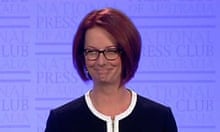


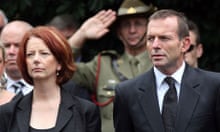

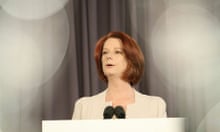
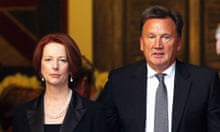
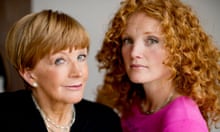
Comments (…)
Sign in or create your Guardian account to join the discussion